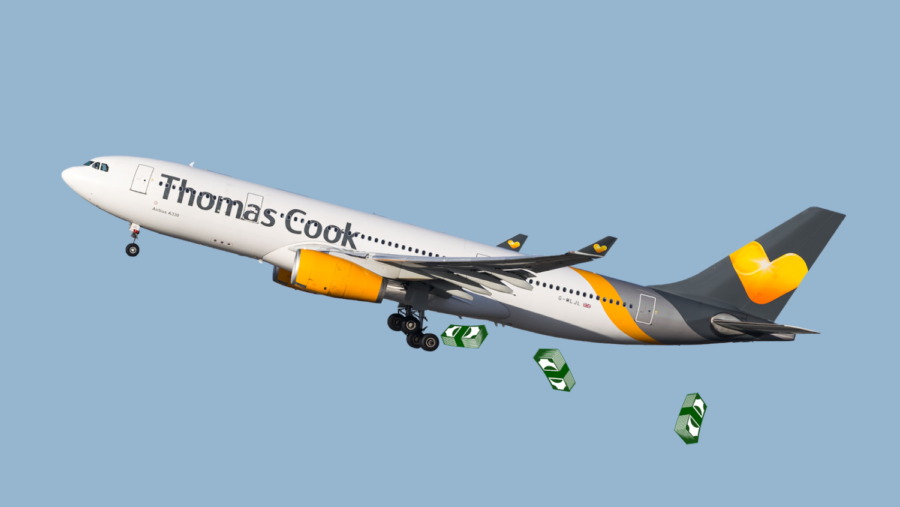On Sept. 23, 2019, an American family had begun to wrap up their vacation to the UK and was driving up to the airport to catch their flight back home. Entering the airport complex, their son stared out of the rear window of the car, amazed at the impressive show of machinery.
“Which one are we going to be on?” he wondered.
Arriving at the terminal, the family sifted through the unusually large crowd at check-in. They soon learned that the row of gray-tailed planes standing outside wouldn’t be taking anyone home. And, after hopping through several different airline customer service counters, they were informed that other flights were booked full for the next week.
They were stranded.
According to The Guardian, 500,000 individuals felt the collapse of Thomas Cook, one of the UK’s largest and longest-standing travel companies. The airline continued to sell tickets up until the end.
As a result, the UK’s Civil Aviation Authority stepped in to arrange for the transfer of its citizens who were effectively stuck, and to refund those who were affected. Launching this transfer of passengers was no easy feat, and set UK taxpayers back £100m.
We are sorry to announce that Thomas Cook has ceased trading with immediate effect.
This account will not be monitored.
Please visit https://t.co/WWiKkzLYQJ for further advice and information.#ThomasCook pic.twitter.com/Nf1X3jn97x
— Thomas Cook (@ThomasCookUK) September 23, 2019
The downfall of Thomas Cook went in the record books as the largest UK airline collapse in history, but it’s important to note that the markets aren’t selective. This pattern of airline collapses has become more prominent in the past decade and is especially evident in the past three years.
In Europe, a constant pattern as analyzed by Wendover Productions has been observed during the months of September and October during the past three years. It found that a certain amount of airlines declare bankruptcy. Airlines tend to fall in these months because they are required to pay the accumulated debt acquired over the summer months when travel demand is high.
Over the past three years, eight airlines have ceased operations in either the months of September or October, with only one airline ceasing operations during another time of the year.
Since each airline's business strategy and resources vary greatly from one another, it’s difficult to compare all airlines with one universal metric.
The international aviation market already retains approximately 1% of the world’s economy. In fact, the IATA predicts that air travel will increase by an additional 20% over the course of the next 20 years. So why can’t these airlines survive?
In the past decade, a new type of airline business strategy has come to market: the introduction of low-cost long-haul carriers. These airlines generally make long-distance trips, such as transatlantic flights, attempting to undercut other flagship carriers.
“Emerging transatlantic long-haul [low-cost carriers] have a significant [20-30%] cost advantage over transatlantic carriers,” stated an analytical article.
As a rule of thumb, these low-cost carriers should be considered as the most volatile type of airline; the gap between the airline’s required operating budget and profit is always closing. In the case of XL Airways, a long haul carrier, based in Europe, the airline was allegedly put out of business by other more efficient carriers and a steady fuel price increase. It only took a matter of months and a series of unfortunate events to put the airline in its grave, a reality all too familiar for airlines of this type.
On paper, domestic-type short-haul carriers shouldn’t be as volatile as low-cost long haul carriers. These airlines generally serve many more routes and thus aren’t dependent on one particular travel economy. This allows any such airline two privileges that low-cost long haul airlines don’t have. Should the airline begin to financially struggle from either reduced demand or increased fuel costs, they can simply restructure and suspend certain less-profitable routes.
This seems to be exactly what happened.
In late 2014, Monarch Airlines began to internally restructure and closed part of one of their hubs. This restructuring led to a 19% drop in ridership during the next year. However, the airline’s attempt to restructure left them vulnerable in the European Market.
“Monarch airlines was not big enough, and thus did not have the purchasing power, to survive in this market,” said Robyn Byde, an analyst at Cantor Fitzgerald.
Although the falls of these airlines seem to create unnecessary difficulty for the individual, it’s also important to remember that this process makes room and creates data a newer airline can use to better adapt to ever-changing needs of customers and the economy.
The low-cost flying demand between San Francisco and Paris was previously served by XL Airways. Its demise has created room for Frenchbee, a new low-cost long-haul carrier with a different business strategy. Instead of simply flying directly between San Francisco and Paris, Frenchbee flies from French Polynesia, stopping in San Francisco, to continue to Paris. To serve this route, the airline operates an Airbus A350, one of the world’s most efficient commercial aircraft.
Throughout their history, both of these carriers have been in constant competition with flagship carrier Air France who regularly operates a Boeing 777 and occasionally flies an additional A380, the largest passenger jet on identical routes. In the long run, this process benefits the consumer, allowing them to fly for the lowest fare economically possible.













